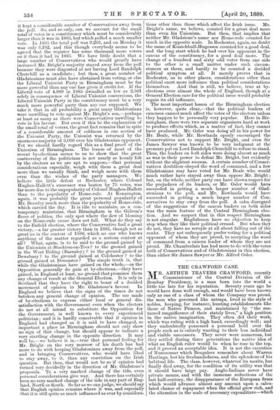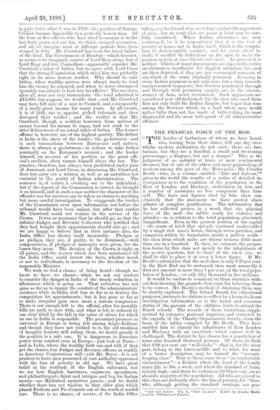THE CRAWFORD CASE.
MR. ARTHUR TRAVERS CRAWFORD, recently Commissioner of the Central Division of the Bombay Presidency, is a man born into the world a little too late for his reputation. Seventy years ago he would have done well enough, and would have been known only as one of a class of whom the Company was proud, the men who governed like satraps, lived in the style of nobles, keeping, for instance, hunting establishments like those of Native Princes, and maintained by "the sus- tained magnificence of their stately lives," a high position in the native imagination. They often did their work, which was ruling with a high hand, exceedingly well; and they undoubtedly possessed a personal hold over the people such as is entirely wanting to their less individual and visible successors. They never were numerous, but they settled during three generations the native idea of what an English ruler would be when he rose to the top, and it proved an acceptable idea. It is not the execution of Nuncoomar which Bengalees remember about Warren Hastings, but his freehanded_ness, and the splendour of his habitual life. The class, however, whatever its merits, has finally died away, for the condition of its utility was that it should have large pay. Anglo-Indians never have private means, and with the immense reductions of the last half-century, the disappearance of the European firms which would advance almost any amount upon a calcu- lated chance of repayment when the official grew rich, and the alteration in the scale of necessary expenditure—which is quite twice what it was in 1840—the position of Satrap- Civilian became impossible to a perfectly honest man. Of the four or five officers who have tried to assume it in the last forty years, not one has, we think, escaped accusation, and all, we imagine, must at different periods have been steeped in debt. Mr. Crawford has been the latest failure of the kind. The Government of Bombay—which does not, as seems to be imagined, consist of Lord Reay alone, but of Lord Reay and two Councillors—apparently consider Mr. Crawford a taker of bribes, but we agree with Lord Cross that the strong Commission which tried him was probably right in its more lenient verdict. Why should he take bribes, when wealthy natives were always ready to lend him the money he required, and when he never attempted (possibly was afraid) to look into his affairs ? The amounts, after all, were not very tremendous—the total admitted is £15,000, but suppose we double that—and Mr. Crawford may have felt sure of a seat in Council, and consequently of a really great income for many years. At all events, it is of little use to appoint picked tribunals and then disregard their verdict ; and the verdict is that Mr. Crawford, though a reckless borrower from natives of money beyond his means to repay, had not sunk to the utter debasement of an actual taker of bribes. The former offence is, however, one of the highest gravity. The debtor in India is the slave of the lender ; the go-between—and in such transactions between Europeans and natives, there is always a go-between—is certain to take bribes nominally on the European's account ; and the lender himself, on account of his position as the great offi- cial's creditor, often vaunts himself above the law. The practice, therefore, has always been prohibited under pain of dismissal, and Lord Cross, in dismissing Mr. Crawford, does but carry out a written as well as an unwritten law essential to the purity of Indian administration. The sentence is, of course, a crushing one to the individual ; but if the report of the Commission is correct, he brought it on himself, and in such a case neither the character of the offender nor his services can be taken as claims to anything but more careful investigation. To exaggerate the verdict of the Commission even upon information not before the tribmial would have been unjust, but after that verdict Mr. Crawford could not remain in the service of the Crown. It was as necessary that he should go, as that the inferior Judges and Revenue Collectors who testified that they had bought their appointments should also go ; and we are happy to believe that in their instance also, the India Office has shown itself inexorable. Pledges or no pledges, they are, if guilty, to be dismissed,—with compensation, if pledges of immunity were given, for the losses they incur. The decision of the Crown is right on all points, and the secrecy which has been maintained till the India Office could review the facts, whether harsh or not to individuals, is necessary to the freedom of the responsible Minister.
We wish we had a chance of being heard—though we know we have no chance—when we ask our readers to consider the danger in India of the steady reduction in allowances which is going on. That reduction has not gone so far as to impair the comfort of the administrators' existence while in India, still less so far as to destroy the competition for appointments ; but it has gone so far as to make irregular gain once more a serious temptation. There is not enough left to the official, after his monthly bills are paid, to save with, and what is left is reduced by one clear third by the fall in the value of silver, for which no one in India is responsible. The pecuniary pressure so universal in Europe is being felt among Anglo-Indians, and though they have not yielded to it, the old tradition of haughty honesty still ruling them, we doubt greatly if the position is a safe one. It is dangerous to dissociate power from comfort even in Europe—just look at Paris— and in India, where the wealthy both can and will, if they get the chance, buy Judges and Revenue officers as readily as American Corporations will—vide Mr. Bryce—it is not prudent to leave men possessed of vast authority oppressed with the fear of poverty in old age. We have great belief in the rectitude of the English cultivated, but we see how English barristers, engineers, speculators, and philanthropists thirst and intrigue and beg for Indian money—see Hydrabad narratives passim—and we doubt whether there was not wisdom in that older plan which placed Prefects and Pre-Consuls out of the reach a sordid care. There is no chance, of course, of the India Office taking any backward step, no refuge against the arguments of envy ; but we trust that one point at least may be care- fully considered. When Indian allowances are next rearranged, let it be remembered that it is the fear of poverty at home, not in India itself, which is the tempta- tion to dishonourable conduct ; and let every effort be made, if needful by deductions on the spot, to make the pension system at once liberal and exact. At present it is neither. Chiefs of many departments are expected to retire on allowances insufficient for English suburban life, and are then deprived, if they are not covenanted servants, of one-third of the sums originally promised. Economy in every Indian payment is not only wise, but a duty towards unrepresented taxpayers ; but Services penetrated through and through with pecuniary anxiety are, in the circum- stances of Asia, never economical. Such arguments are considered now old-fashioned, but the men who used them first not only built the Indian Empire, but begot that tone among the Services which, in a land where men would rather bribe than not, has made of bribe-taking the most disgraceful and the most infrequent of all administrative offences.



































 Previous page
Previous page